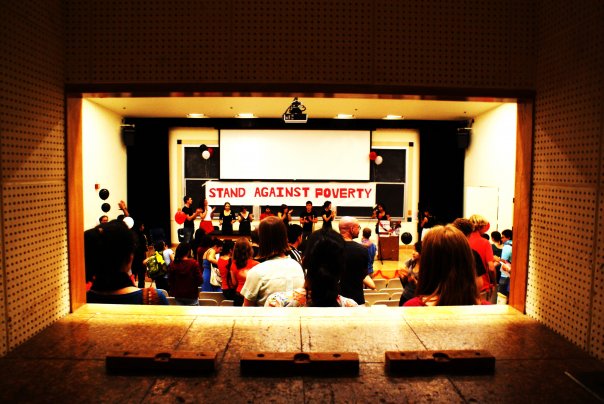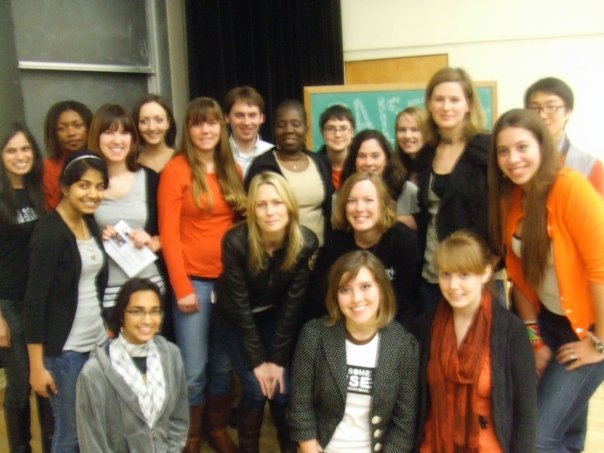A HUGE thank you to everyone who came to Stand Against Poverty... it was a great event, and I hope you were as inspired by our awesome speakers as I was!
I wanted to post the links to the petitions that we wrote at the event here, for those of you who couldn't make it to the event:
MDG #1: Fight Poverty and Hunger:The facts:
► Approximately 1.02 billion people in the world are hungry (http://www.one.org/c/us/issue/185/).
► In Southern Asia, 46% of children under 5 were underweight in 2006 (http://mdgs.un.org/unsd/mdg/Resources/Static/Products/Progress2008/MDG_Report_2008_En.pdf#page=11)
► The global food crisis may push 100 million more people deeper into poverty (http://www.un.org/millenniumgoals/poverty.shtml)
What you can do: Speak out about agricultural subsidies and unfair trade rules
“One of the biggest issues in development today is the massive subsidy that rich countries provide to their agricultural sectors. These subsidies depress world prices for agricultural commodities and make it impossible for poor farmers in the Third World to make a living. To make the matter worse, the G-8 countries also have high tariffs on Third World products.” (source: lecture supplement, IAS 115). One way that you can do something about the global food crisis as a resident of a G-8 country is to write to your representatives and senators about this issue.
Read more about different perspectives on the food crisis and what you can do:
Food First,
http://www.foodfirst.org/US Working Group on the Food Crisis:
http://www.usfoodcrisisgroup.org/One Campaign, Food Security in Focus:
http://one.org/c/us/hottopic/3118/Write to your senators and Representatives:
Barbara Lee
1301 Clay Street Suite 1000-N
Oakland, CA 94612
Dianne Feinstein
One Post Street, Suite 2450
San Francisco, CA 94104
Barbara Boxer
1700 Montgomery Street, Suite 240
San Francisco, CA 94111
MDG#5: Reduce Maternal MortalityMore than half a million women die each year from complications related to pregnancy and childbirth – one every minute. Most of these deaths could have been prevented. The complications are largely unpredictable, but they can be treated. Millennium Development Goal 5 seeks to cut maternal mortality by 75 per cent from 1990 levels by 2015. However, very few countries are on track to reach this target. In sub-Saharan Africa, where the problem is most acute, progress has been negligible.
Maternal Mortality in Sierra Leone
One in eight Sierra Leonean women die giving birth. Health care facilities are understaffed, lack basic equipment and medicines and are far from people's homes. Pregnant women and their families struggle to afford the costs of getting to a hospital and the costs of the care they would receive there.
Sierra Leone is recovering from 11 years of civil war, which ended in 2002. It will take time and a lot of outside help to rebuild what was anyway an underresourced health care system. But reducing maternal mortality is not impossible and should start immediately. Responsibility starts with the government: from the very top, the government must show its determination to tackle maternal mortality. Take action online:
http://takeaction.amnestyusa.org/siteapps/advocacy/index.aspx?c=jhKPIXPCIoE&b=2590179&template=x.ascx&action=13162Urge President Garcia of Peru to ensure access to maternal health care
Although Peru is a middle-income country, its maternal mortality rate is the second worst in South America. Low-income, rural, and indigenous women are most at risk. Peru has been a focus of the human-right-to-maternal-health community, and President Alan Garcia has promised better equity in maternal health funding. But he has yet to fulfill that promise.
Take action online:
http://www.amnestyusa.org/countries/sierra_leone/slpetition.php
 Happy New Year from Amnesty International at UC Berkeley!
Happy New Year from Amnesty International at UC Berkeley! 




























